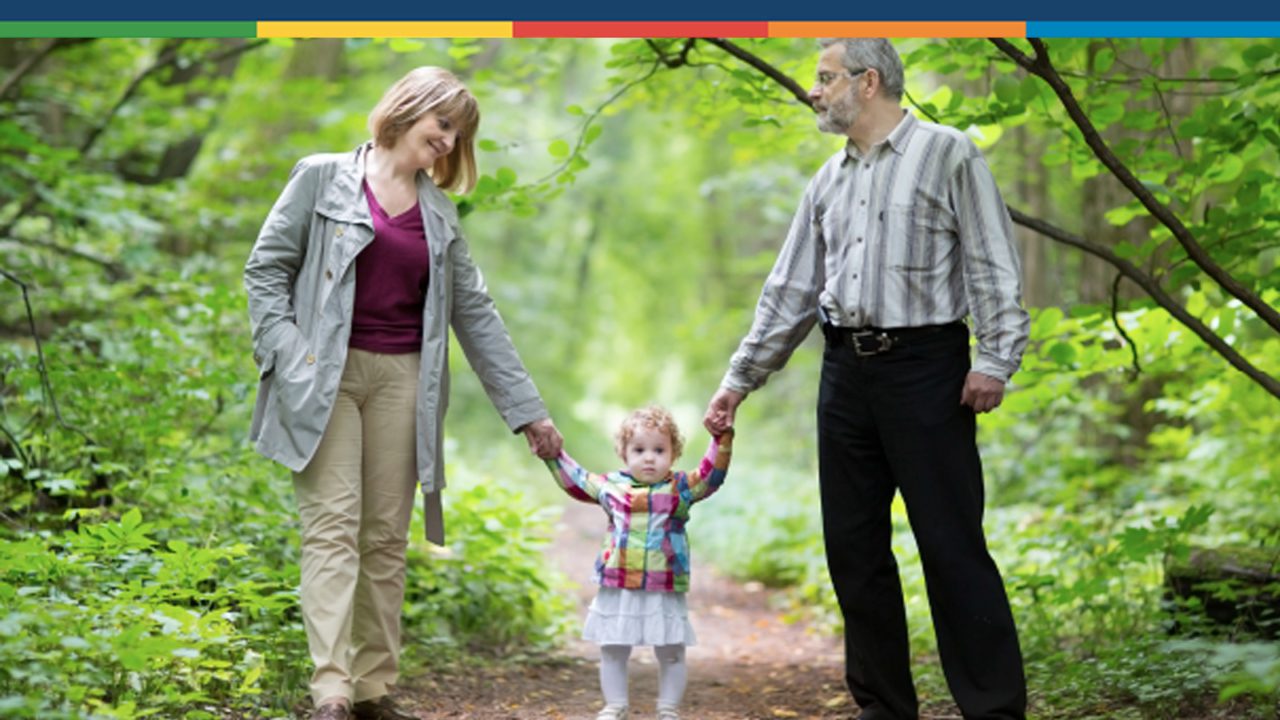Grandparents talked. We listened. ZERO TO THREE recently set out to learn more about the experience of grandparents who share the care of their grandchildren. Here’s what we learned.
IN THIS RESOURCE
Raising the Next Generation
In the United States, grandparents play a huge role in raising the next generation. Nearly 1 out of 4 children under 5 years old is looked after by grandparents while their parents work or attend school. That’s 4.8 million children, about the same number as are enrolled in formal child care.
It’s not surprising that grandparents are frequently a parent’s child care provider of choice. Grandparents offer love, convenience, continuity, and security, and they help ease the financial burden in situations where formal child care is unaffordable.
For many grandparents, the caregiving role brings joy and new meaning to life. But being a grandparent who provides regular child care can also be a big adjustment, as grandparents put aside their own needs to take care of the next generation.
With the generous support of the David and Lucile Packard Foundation, ZERO TO THREE set out to learn more about the experience of grandparents who provide regular child care to their grandchildren. Our goal was to explore the range of benefits and challenges grandparents encounter as caregivers of young children.
In Their Own Words
In spring of 2017, ZERO TO THREE hosted three in-depth focus groups (two in English, one in Spanish) among grandparents who provide caregiving for at least one grandchild under 6 years old for a minimum of 15 hours per week. Findings from these groups include the following key messages:
1. Today’s grandparents defy stereotypes.
They humorously reject the image of (as one respondent put it) “a rocking chair grandma.” In fact, the average age of first-time grandparents in the U.S. is about 52, and about half of today’s grandparents are under 65.
Yes, [my grandson calls me] “Glam.” I’m too young [to be a grandmother]. I’ll be 44 in a couple weeks, but I feel like I am too young to be a granny.
Jael
2. They express joy at the role they play in their grandchildren’s upbringing.
Focus group participants reported that being a grandparent caregiver was, in many ways, more satisfying and joyful than being a parent. Most felt this was due to two funda-mental reasons: first, the grandparent role is different —less discipline and more love. Second, grandparents said that they, themselves, are different than they were as parents—more patient, more experienced, and less anxious.
I know a lot of people that are very old when they become grandmas. They say things like ‘In my time, we didn’t use cell phones. I don’t know how to use GPS.’ I can still learn more. I’m not all that outdated.
Rosaura
3. Grandparents step in because they see a need, or have been asked directly for help with child care.
Most focus group participants stated definitively that their decision to help with caregiving was motivated by love—both for their adult children as well as for their grandchildren—and that they have a powerful need to stay close to family. Many grandparents in our focus groups also described this caregiving role as a family expectation they were happy to fulfill. At the same time, grandparents shared that their adult children often reached out for help due to family needs or demands: the adult child needed to work but could not afford child care, the adult child received little or no assistance from her co-parent, or the grandchild had a special need which made formal care settings more challenging to find.
I do it out of love for my daughter as well as love for my grandson. The grandson is the dividend… As a single parent, [my daughter] turned to us and said, ‘Would you like to join us out here, in California?’ I said, ‘That sounds pretty good to me.’
Carl
4. Grandparents sometimes experience conflict with their adult children over what’s best for the grandkids in their care.
While some grandparents in our focus groups reported that they had successfully developed an effective care-giving partnership with their adult children, others found “sharing the care” more challenging. Most of these challenges arose from a mismatch in expectations around roles and responsibilities; the most contentious topics seemed to be related to discipline and nutrition. Grandparents agreed that finding ways to collaborate and share information with their adult children and their partners would be valuable.
5. Parents have confidence in their own parenting experience as a guide to caring for their grandchildren.
Focus group participants were clear that they based their caregiving strategies on many years of real-world experience. Grandparents said that when it came to raising children, they learned by doing, not by books, classes or talking to experts.
You don’t need to look at a blog—just life. I’m old school. I learn from talking to someone, and what your parents and grandparents did.
Jacquelyn
I mostly look at my own experiences. I had five kids, and now I am applying the same experience to my grandkids.
Lina
6. Even though they trust their own experience, today’s grandparents are open to learning.
They look to the Internet, community resources, and each other for information about child care. Some focus group participants reported regularly consulting Google and YouTube for up-to-date information on topics ranging from car seats to temper tantrums. This reflects current trends in Web usage; according to a 2016 survey conducted by the Pew Research Center, 89% of American adults ages 50–64 use the Internet, with 67% use among those 65 and older. Grandparents in our focus groups also frequently turn to their social network—their friends with grandchildren—for support and information. In addition, some grandparents found community events for their grandchildren through senior center course listings or by calling the local government information line.
Things have changed since the time we had our own kids. I’ll Google it. It’s like ‘Wow, we didn’t have that when you guys were young.’ It’s different…all these modern things you can get for a child.
Debbie
7. Grandparents have big dreams for their grandchildren.
Focus group participants see themselves as playing a central, if supporting, role in ensuring that these dreams are realized. This passion offers a powerful foundation for agencies and organizations seeking to build partnerships with grandparents.
[My dreams for them?] To me, whatever they set their minds to do… just to work and live out of integrity, to be honest, to be truthful, to treat people right, and to do whatever their hearts desire.
Pat
Mine is education and safety. I can’t draw a line between those two, because I didn’t have much of either.
Renoir
Recommendations
Grandparents bring with them many years of caregiving experience and a deep and abiding love for their grandchildren. Grandparents are also more technologically savvy than previous generations and open to connecting with their peers to share ideas and offer support. While many see their role as an important and lovingly fulfilled family responsibility, it is not always an easy road when resolving caregiving conflicts with their adult children and their partners.
The recommendations below recognize the tremendous strengths grandparents offer as care providers and validate the challenges that are inherent in these arrangements. It is our hope that these may assist professionals in designing community services for grandparents that best meet their needs and elevate their expertise.
The Call to Action for Professionals Working with Grandparents in Their Community:
1. Honor the experience of grandparents.
Although some practices have changed since they were parents, many of the core components of great care-giving—nurturing young children; playing together; and talking, singing, and storytelling—have stayed the same. For professionals working with grandparents, validating grandparents’ strengths and expertise in caregiving can be an excellent strategy to begin building the relationship and can serve as a foundation for offering new learning opportunities. Our Grandparent Guide resources were created specifically for this “been-there, done-that” expert audience of grandparents. This resource suite provides a quick reference guide on what’s new and what has stayed the same when it comes to research on safe sleep, conflict-free mealtimes, limit-setting without spanking, and making the most of everyday moments.
2. Encourage grandparents and parents to share perspectives and problem-solve as a caregiving team.
It is often not easy for two adults to “share the care” of a young child, but this collaboration may be especially challenging for a grandparent and her adult child. While both adults care deeply about the child’s well-being, they may disagree on specific strategies because of their different perspectives, knowledge, and experiences. The family dynamic can make cooperation more challenging as the adult child works to establish her identity and authority as the ”parent” and decision-maker in this arrangement with the grandparent. Professionals working with grandparents can explore these issues and validate both grandparents’ and parents’ feelings and concerns, guiding them to a shared conversation around goals and boundaries. Our If You Only Knew tool can be helpful in these discussions, as it guides families through a conversation designed to share strengths, communicate concerns, and problem-solve together.
3. Create experiences especially designed for grandparents to connect with one another.
Although many of the grandparents in our focus groups were skeptical of formal learning experiences such as books and classes, they welcomed the chance to connect with each other to share ideas, experiences, and tips. Professionals at the community level may wish to experiment with designing a grandparent-and-child experience that provides opportunities for grandparents to connect with peers and expand their social network.
For more on the role of grandparents as child care providers, see our Infographics featuring feedback from grandparents who shared their experiences with ZERO TO THREE.






